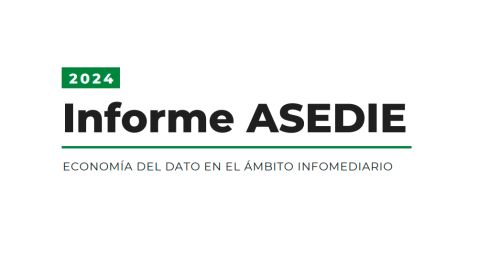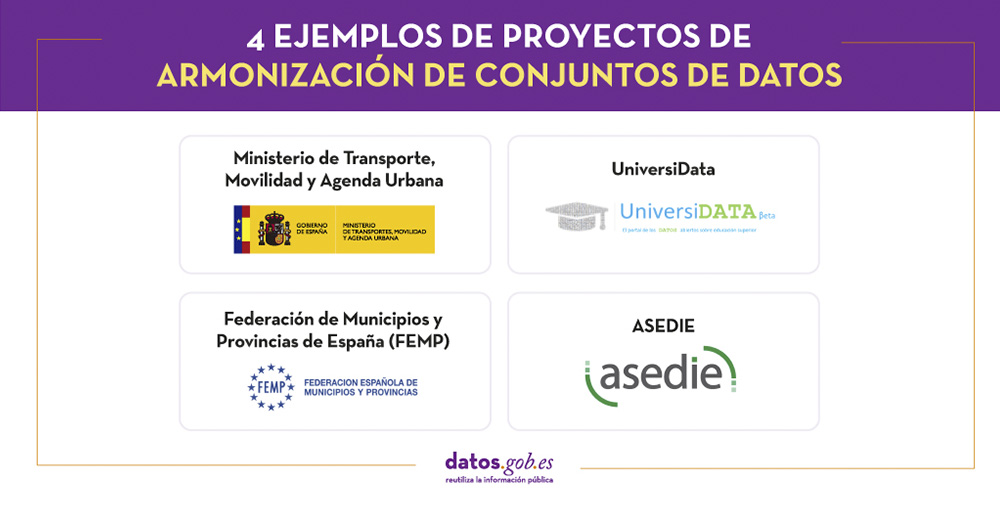The 12th edition of the ASEDIE Infomediary Sector Report is available
Fecha de la noticia: 29-04-2024

The Multisectoral Information Partnership (ASEDIE) has published the twelfth edition of its "Report on the Infomediary Sector", that reviews the initiatives to boost the data economy in the country. In addition, this edition commemorates the 25th anniversary of the association in the sector.
In the 12th Report on the Data Economy in the infomediary sphere, ASEDIE provides accurate figures on the sector in Spain to continue its annual work of highlighting and conveying its size and importance. The presentation of this edition took place at Madrid International Lab's auditorium on 20 March.
The main findings of the study are summarised below.
More than 23,000 people work in the infomediary sector in Spain
In the document, ASEDIE measures the health of the sector of the 756 public data reuse companies that have been identified as active. These companies employ almost 23,300 people in Spain, which translates into an increase of 3.6% compared to the figures in the previous report. The re-using companies analysed in the report take advantage of both public and private information to create value-added products for other companies and all society.
In addition, the study notes "the continued growth of the infomediary sector, with new players joining year after year, improving the information exchanges inherent in the sector and increasing user confidence". Reflecting this positive trend, the sector generated an overall turnover of 2,331 million euros, an increase of 2.4% over the previous year.
In order to identify these results, ASEDIE carries out an analysis methodology also described in its report that subdivides the sectors involved. Among the companies analysed, the majority belong to the Geographic Information sector (22%), Market Research (19%), Financial Economics (19%) and IT Infomediation (17%). In total, these three sectors account for 76% of the companies.
Of all the companies analysed, 63% were created more than 10 years ago, although 51 companies have been created in the last year. And half of the infomediaries have a turnover of more than 473,000 euros, according to the report. A second group of two sub-sectors (Technical Consultancy and Publishing) contribute 14% more, leaving the remaining sub-sectors (Culture, Directorial, Meteorological and Tourism), with a representation of 9%.

Results of the survey carried out among the Autonomous Regions and the academic sector
Other revealing content included in the 12th ASEDIE Report is a summary of the first steps taken by the newly created ASEDIE TOP 10, as well as the analysis of a survey of two main groups: those responsible for transparency and open data issues in the 17 Autonomous Communities and the academic sector.
The TOP ASEDIE is a public-private collaboration initiative, supported by the 17 Autonomous Communities, which seeks to promote the opening of certain datasets and which has been carried out periodically. The initiative was launched in 2019 with the TOP 3, which prompted the opening of the databases of Associations, Cooperatives and Foundations. Two years later, a second Top 3 ASEDIE (Energy Efficiency Certificates, SAT Registers and Industrial Estates) was launched, which is now a TOP 10 with four new databases: economic agents, education centres, health centres and ERES-ERTES.
The survey also drew a number of conclusions :
- 75% of respondents indicate that they are satisfied with the technological capacity they have with regard to data openness.
- 63% of respondents are not aware of the socio-economic impact of opening their databases.
- 50% of respondents do not know the profile of their users and customers. However, 75% have systems in place to measure access, downloads and visits to the datasets they publish.
- 89% of academic institutions say that public data enables them to develop useful solutions.
Success stories: exemplary infomediary companies
In addition to offering results on the state of the infomediary sector in Spain and the conclusions of the surveys carried out in the Autonomous Regions and the academic sphere, the report highlights some use cases that stand out as successful in the task of obtaining value from the reuse of data. Some of these are summarised below:
- API connector with Salesforce and Microsoft Dynamics: a solution that automatically integrates the data of 7.6 million companies and freelancers in Spain and Portugal into Salesforce and Microsoft Dynamics, the two main CRMs on the market.
- GEOCODE Fraud from CTI Solutions: a data validation and alert management solution for the detection of irregular transactions.
- InAtlas Geomarketing Worldwide: a tool based on advanced Location Analytics and Geodata Visualisation technologies, to search for customers and optimal locations to expand business.
In summary, through its report, ASEDIE reveals the growing importance of the data economy and clearly reflects Spain's transition towards a more informed and transparent society, evidencing the fundamental role played by the infomediary sector. We see the need to overcome existing challenges through greater collaboration between all stakeholders to ensure a future where data is managed in a more open, accessible, effective and secure manner.














